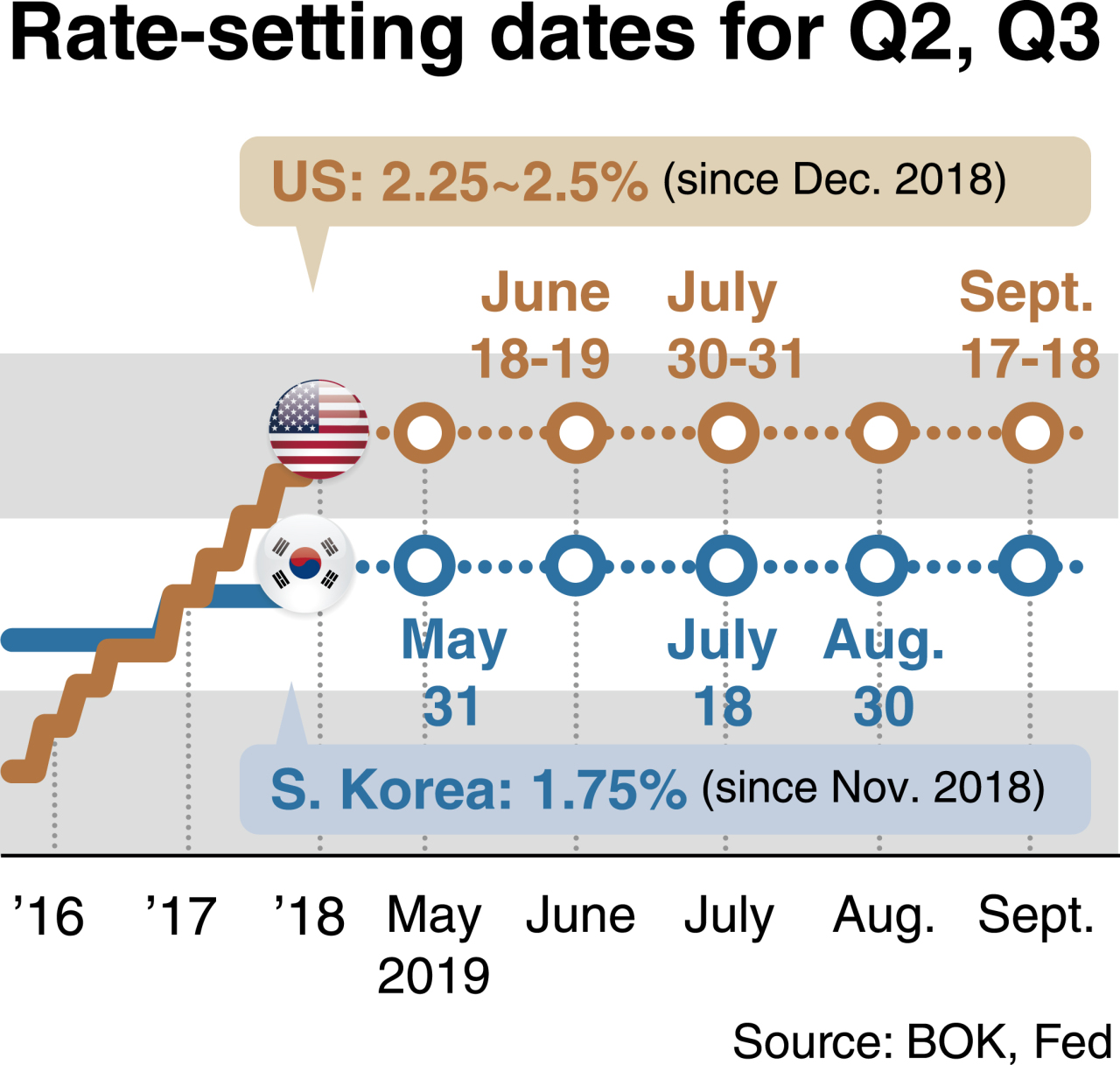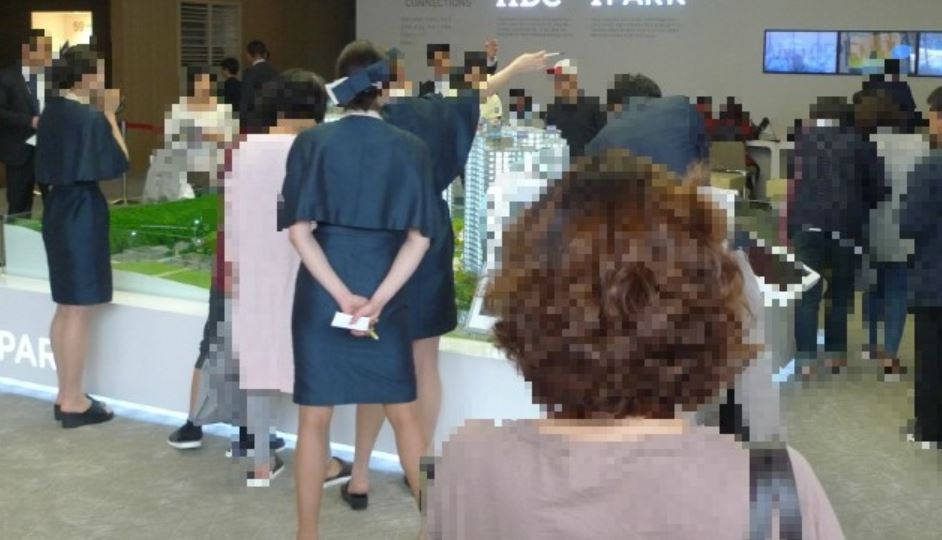SEJONG -- The Moon Jae-in government has repeatedly expressed its commitment to lower housing prices in Seoul, amid an extraordinary situation in which many apartments surged in price more than 50 percent from late 2016 through 2018.
Most of its anti-speculation measures have been mapped out by the Finance Ministry, the Land Ministry and the Financial Services Commission.
But the presidential office has refrained from seeking to normalize apartment prices by normalizing interest rates. This is despite the known effectiveness of key rate hikes as a powerful, fast-acting remedy for property speculation.
 |
(Graphic by Heo Tae-seong/The Korea Herald) |
While monetary policy falls under the independent authority of the Bank of Korea, it seems that secretaries to the president and senior ministry officials prefer regulations over benchmark rate hikes.
Since Moon took office in May 2017, the central bank has raised the key rate only twice -- first in November 2017 and again in November 2018 -- by a combined total of 50 basis points. Further, some critics regarded the hikes as a passive way of preventing capital outflow in response to rate hikes in the US.
Still, the current level of 1.75 percent per annum over the past six months is fully 100 basis points lower than it was in early 2013, when former President Park Geun-hye took office.
This indicates that the BOK has shied away from adopting tighter monetary policy even after the impeachment of Park, whose government slashed the key rate on six occasions during the years 2013 to 2016 in attempts to shore up the economy by vitalizing the construction sector.
Last year, the government continued to reiterate that Seoul’s apartment prices would drop gradually as a result of its policies, which included tighter regulations for mortgage loans and higher capital gains taxes for homeowners.
The policies appeared to be having the intended effect during the second half of 2018 with trading prices falling to some extent, particularly among complexes in affluent parts of southern Seoul such as Gangnam-gu and Seocho-gu.
But real estate insiders and online commenters remain pessimistic for the most part.
Cynical remarks abound on internet portals, such as: “After rising 1 billion won ($836,000) for two years, the apartment prices have inched down just 100 million to 200 million won in Gangnam.”
Real estate agents say both the number of sellers and the number of buyers have declined over the past few months.
“The interest rate, under 2 percent, is something that homeowners with mortgages still appear to be willing to tolerate,” said an agent in the Seoul metropolitan area. “In addition, they are pinning their hopes on a potential future policy that might reinvigorate the economy amid low GDP growth.”
The evidence indicates that there is little reason for homeowners to rush sales by lowering their asking prices -- regardless of whether they own a single property or multiple properties.
 |
Members of the public observe a model house, which showcases miniature exteriors and actual-size interiors for an apartment complex, in a satellite city in Gyeonggi Province. (HDC Group) |
Though homebuyers in Seoul are still waiting for prices to drop further, other policies -- like the establishment of a third wave of “new towns” in its satellite cities -- are pulling down prices only in neighboring Gyeonggi Province and Incheon.
According to the Korea Appraisal Board, prices of apartments in the western Ilsan district of Goyang had fallen 0.19 percent week over week as of the second week of May. It was the highest on-week drop in eight months, since the last week of August 2018 saw a 0.34 percent fall.
Figures in Seo-gu, Incheon, followed suit, posting an on-week drop of 0.08 percent, higher than the 0.03 percent drop seen the previous week.
The areas of Ilsan in Goyang and Geomdan in Incheon are part of the first and second wave of new towns, respectively, which were fostered under past administrations’ policy to decentralize the capital region. They are likely to experience a negative impact from the incumbent government’s third wave of new towns -- to be built in Changneung, Goyang, and Gyeyang, Incheon -- both of which are closer to Seoul.
In contrast, Seoul has seen apartment prices level off since the first week of March. Seocho-gu posted a modest drop of 0.04 percent, compared with 0.05 percent the previous week, and apartments in Gangdong-gu also declined at a smaller rate of 0.13 percent, compared with 0.16 percent a week earlier.
A research analyst in Yeouido, Seoul, pointed out that the low interest rates were negatively affecting a variety of indices -- not only housing prices but also the weak local currency against the dollar and import prices for crude products.
He said the central bank was also responsible for a record spike in Seoul property prices.
The next meeting of the BOK’s monetary policy committee, where new rates will be set, is scheduled for May 31.
By Kim Yon-se (
kys@heraldcorp.com)





![[Herald Interview] 'Trump will use tariffs as first line of defense for American manufacturing'](http://res.heraldm.com/phpwas/restmb_idxmake.php?idx=644&simg=/content/image/2024/11/26/20241126050017_0.jpg)

![[Health and care] Getting cancer young: Why cancer isn’t just an older person’s battle](http://res.heraldm.com/phpwas/restmb_idxmake.php?idx=644&simg=/content/image/2024/11/26/20241126050043_0.jpg)

